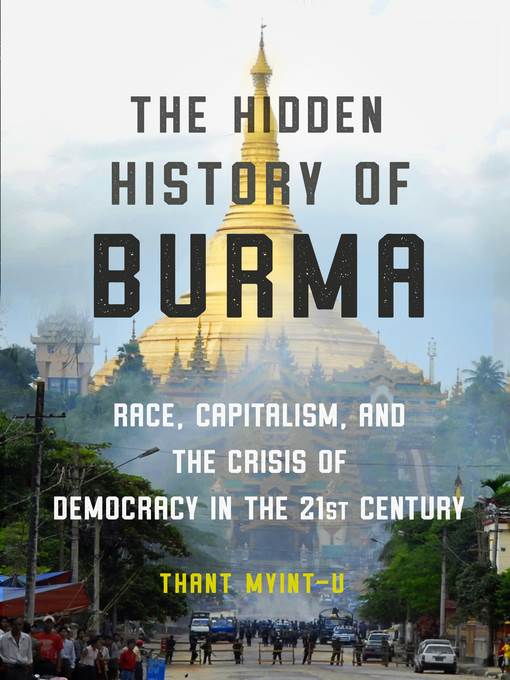
The Hidden History of Burma
Race, Capitalism, and the Crisis of Democracy in the 21st Century
کتاب های مرتبط
- اطلاعات
- نقد و بررسی
- دیدگاه کاربران
نقد و بررسی

September 15, 2019
Recent developments in a South Asian country that, the author suggests, is unduly shackled by the past. At the beginning of the 2010s, writes Myint-U (Where China Meets India: Burma and the New Crossroads of Asia, 2012, etc.), everything seemed to be looking up for his nation: An entrenched military government was giving up power to a civilian one, and "everybody, at least in the West, began to believe that the country was in the midst of an astonishing transformation." Alas, Burma, endowed with some of the planet's greatest biodiversity, is also riven by ethnic tensions and politics colored by money, much of it from the trade in opium-based drugs. In Burmese thought, writes the author, "kala" has an important role--that is, a notion of overarching ethnicity that sharply separates people into clans, tribes, groups of others. Colonizing powers reinforced this division. As the author notes, during World II, Japan backed the Arakanese Buddhists while the British armed the Muslims who are now in the headlines as the Rohingya. These groups continue to clash, with recent ethnic violence forcing untold hundreds of thousands of Burmese Muslims to take refuge in neighboring Bangladesh. The world found much hope in the freeing of former political prisoner Aung San Suu Kyi, who became a member of parliament and then president. However, writes the author, she has since practiced politics pretty much as usual, seeking a reconciliation between her party and the all-powerful military and emphasizing "at every opportunity that she loved the army...and that she wanted more than anything to see it stronger and more respected than ever." The conflict rages on, not just internally, but also with an encroaching China. So does economic anxiety, as the government "advocated liberalization and a welcoming of foreign investment" but refused to abandon cronyism and bureaucratic micromanagement. The author calls Burma an "unfinished nation," and the description seems apt. A pointed analysis of a country that, though much in the news, remains a mystery to most outsiders.
COPYRIGHT(2019) Kirkus Reviews, ALL RIGHTS RESERVED.

October 14, 2019
How did Burma’s civilian leader Aung San Suu Kyi go from Nobel Peace Prize laureate to figurehead for a regime accused of genocide? Former UN diplomat Thant (Where China Meets Asia), offers a lucid, albeit complex, answer in this essential analysis of modern Burmese history. According to Thant, the stage was set for the country’s racial, ethnic, and religious divisions during 19th-century British colonial rule, when an array of cultures, language groups, and tribal identities were lumped together under an exploitative form of capitalism. With independence in 1948 came the world’s longest ongoing civil war. A brutal military dictatorship seized control in 1962 until the early 2010s, when Suu Kyi was released from house arrest and won a seat in parliament. As the military junta loosened its grip on power, Thant explains, the army signed accords with rebel groups, creating a framework in which violence improved the odds of political settlement. That model, and the government’s failure to craft a “new and more inclusive” national identity, Thant writes, influenced the rise of the Muslim Rohingaya resistance movement and ensuing military crackdown and refugee crisis, in which Suu Kyi has refused to intervene. Thant briskly synthesizes insider accounts, news reports, and academic research to make his authoritative case. This perceptive chronicle is vital for understanding Burma’s transition to democratic rule and sobering future prospects.

Starred review from October 15, 2019
George Orwell's service as a police officer in Burma during its British rule ended up inspiring many of his novels. This line from 1984, "Those who control the present, control the past and those who control the past control the future," can be emphatically applied to the story of Burma, a country marked by multiple invasions, colonialism, military occupation, and a racist social hierarchical order. During the 2010s, after decades of military rule, Burma dissolved its military regime and released many political prisoners, including Nobel Peace Prize winner, Aung San Suu Kyi. However, the country's jubilation and optimism was short lived. The "new" government, while seeming progressive, fell into strife and discord over party and philosophical differences, resulting in corruption, civil unrest, and, more recently, the shocking expulsion of countless Rohingya Muslims. Thant Myint-U, Burmese nationalist, former diplomat, writer (The River of Lost Footsteps, 2006), returned to Burma at the behest of ministers who wanted him to serve as an adviser and help facilitate social and economic reforms. Thant's bird's-eye view, long-term scholarship, and deep connection to Burma and its people make for a captivating and engrossing account of a country shifting precariously between possibility and destruction.(Reprinted with permission of Booklist, copyright 2019, American Library Association.)

























دیدگاه کاربران